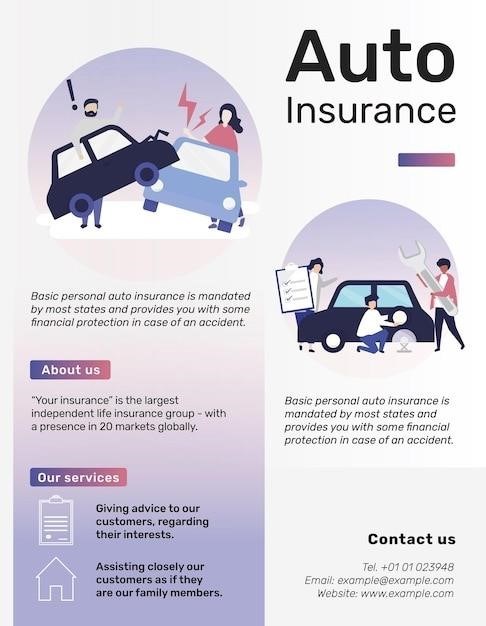
Private Settlement for Car Accident⁚ What You Need to Know
A private settlement for a car accident is a way for the parties involved to resolve their dispute without going to court. This can be a good option if the damages are minor and both parties are willing to compromise. A private settlement agreement is a legally binding document that outlines the terms of the agreement. This document should be drafted carefully to ensure that both parties are protected.
What is a Private Settlement?
A private settlement, in the context of a car accident, is an agreement reached directly between the parties involved, without involving insurance companies or formal court proceedings. It essentially allows both parties to come to a mutual understanding and resolve the matter amicably outside of the traditional legal system. This approach often involves a direct exchange of information, negotiation of compensation, and the signing of a legally binding document known as a private settlement agreement or release of liability form.
This approach can be particularly attractive when the damages are relatively minor, such as a fender bender or a minor scratch on a car. In these situations, both parties may prefer to avoid the time, expense, and hassle associated with insurance claims or legal battles. However, it’s crucial to remember that private settlements are not always the best option, and it’s essential to carefully consider the potential risks and benefits before agreeing to one.
The private settlement agreement, usually in the form of a PDF document, serves as the official record of the agreement. It clearly outlines the terms of the settlement, including the amount of compensation agreed upon, the release of liability, and any other relevant details. This document is vital to ensure both parties understand their obligations and are protected from future legal claims related to the incident.
While private settlements can offer a straightforward and efficient way to handle car accidents, it’s vital to proceed with caution and seek legal advice when necessary. Understanding the nuances of these agreements, potential risks, and your legal rights is crucial to making informed decisions and ensuring a fair outcome.
When is a Private Settlement Appropriate?
A private settlement for a car accident can be a viable option in specific scenarios, but it’s essential to weigh its suitability carefully. Here are some situations where a private settlement might be appropriate⁚
- Minor Damages⁚ If the damage to the vehicles involved is minimal and there are no significant injuries, a private settlement can be a quick and efficient way to resolve the matter. Both parties might prefer to avoid the complexities and delays associated with insurance claims or legal proceedings.
- Mutual Agreement⁚ Both parties must be willing to compromise and reach a mutually agreeable settlement. If one party feels pressured or dissatisfied with the terms, a private settlement might not be the best course of action.
- Clear Liability⁚ The circumstances of the accident should be clear, and both parties should agree on who is at fault. This eliminates the need for lengthy investigations or disputes over liability, simplifying the settlement process.
- No Insurance Disputes⁚ If both parties have adequate insurance coverage and there are no disputes regarding coverage limits or policy terms, a private settlement can be more straightforward. However, it’s crucial to ensure that both parties are aware of their insurance obligations.
- Limited Legal Complexity⁚ Private settlements are best suited for straightforward accidents with no complex legal issues, such as multiple parties, wrongful death claims, or significant personal injuries.
It’s essential to remember that even when a private settlement seems suitable, it’s always advisable to consult with a legal professional to ensure your rights are protected and the agreement is legally sound.
Benefits of a Private Settlement
Opting for a private settlement in a car accident scenario can offer several benefits, particularly when compared to navigating the traditional insurance claims or legal routes. Here are some key advantages⁚

- Speed and Efficiency⁚ Private settlements can be significantly faster than going through insurance companies or engaging in legal proceedings. The process is often streamlined, with less paperwork and fewer delays, allowing for a quicker resolution.
- Control and Flexibility⁚ Both parties have greater control over the settlement process and its outcome. They can negotiate the terms directly, tailoring the agreement to their specific needs and circumstances, without the constraints of insurance policies or court decisions.
- Confidentiality⁚ Private settlements can be kept confidential, avoiding the public record associated with court proceedings. This can be advantageous for individuals who prefer to avoid the potential for negative publicity or reputational damage.
- Reduced Costs⁚ Private settlements can often be more cost-effective than pursuing a claim through insurance or litigation. You can avoid the substantial legal fees, insurance premiums, and court costs associated with formal proceedings.
- Avoidance of Insurance Claims⁚ A private settlement can help avoid the potential impact on your insurance premiums. By settling privately, you may prevent a claim from being filed on your insurance record, which could lead to increased future premiums.
However, it’s important to note that while private settlements offer potential advantages, they also carry certain risks that must be carefully considered before proceeding.
Risks of a Private Settlement
While private settlements offer potential advantages, they also carry certain risks that must be carefully considered before proceeding. It’s crucial to understand these potential drawbacks to make an informed decision⁚
- Underestimation of Damages⁚ A private settlement may lead to an underestimation of damages, especially if you lack the expertise to assess the full extent of your injuries or property damage. This could leave you financially disadvantaged in the long run.
- Lack of Legal Counsel⁚ Negotiating a private settlement without legal representation could result in an unfair agreement. You might be unaware of your rights or miss critical legal considerations that could impact your settlement amount.
- Future Liability⁚ A private settlement agreement may not fully release the other party from future liability. If new injuries or damages arise later, you may find yourself unable to pursue further claims.
- Unforeseen Circumstances⁚ Private settlements are based on the current understanding of the situation. If unforeseen circumstances arise, such as the discovery of additional injuries or evidence, you may be unable to renegotiate the settlement.
- Insurance Coverage⁚ Your insurance policy may have specific provisions regarding private settlements. Failure to comply with these provisions could impact your coverage or lead to disputes with your insurer.
It’s essential to carefully weigh the potential benefits and risks of a private settlement before making a decision. Seek legal advice and thoroughly understand the terms of the agreement before signing anything.
Key Elements of a Private Settlement Agreement
A private settlement agreement is a legally binding contract that outlines the terms of the agreement between the parties involved in a car accident. It’s crucial to include specific elements to ensure a clear and enforceable agreement⁚
- Identification of Parties⁚ The agreement should clearly identify all parties involved, including their full names, addresses, and contact information. This ensures proper identification and avoids confusion.
- Description of the Accident⁚ A detailed description of the accident should be included, specifying the date, time, location, and circumstances of the incident. This provides context and establishes the basis for the settlement.
- Release of Liability⁚ The agreement must explicitly state that the parties involved are releasing each other from any further claims related to the accident. This signifies the finality of the settlement.
- Compensation⁚ The amount of compensation to be paid by each party should be clearly stated, including details such as payment schedule, method of payment, and any specific deductions.
- Signatures⁚ All parties involved must sign the agreement, indicating their acceptance of the terms. Signatures should be witnessed by a neutral third party to ensure validity.
- Legal Counsel⁚ It is strongly recommended to have legal counsel review the agreement before signing. An attorney can ensure the agreement protects your interests and avoids any legal loopholes.
A well-drafted private settlement agreement should be comprehensive and clear, leaving no room for ambiguity or future disputes. It’s essential to seek legal advice and review the agreement thoroughly before signing.
Legal Considerations for a Private Settlement
While private settlements offer a quicker and less formal way to resolve car accident disputes, it’s essential to be aware of the legal implications. Here are some key legal considerations⁚
- Statute of Limitations⁚ Each state has a specific time limit within which legal claims can be filed. It’s crucial to understand the statute of limitations for car accident claims in your jurisdiction to ensure that the private settlement agreement is reached within the legal timeframe.
- Liability⁚ Determining fault and liability is crucial in any car accident settlement. The agreement should clearly define who is responsible for the accident and the extent of their liability. It’s advisable to consult with an attorney to ensure that liability is accurately assessed.
- Insurance Coverage⁚ If insurance is involved, it’s essential to understand the terms of your policy and how it affects the private settlement. Your insurer may have specific requirements or limitations that need to be considered. It’s best to inform your insurance company about the private settlement and seek their guidance.
- Waiver of Rights⁚ Signing a private settlement agreement constitutes a waiver of your right to pursue legal action against the other party. It’s important to understand the full implications of this waiver before signing any agreement.
- Legal Counsel⁚ Seeking legal advice from an experienced attorney is highly recommended before entering into a private settlement. An attorney can review the agreement, assess its legal validity, and protect your rights.
By carefully considering these legal considerations, you can ensure that your private settlement agreement is legally sound and protects your interests.
Resources and Tips for Negotiating a Private Settlement
Navigating a private settlement can seem daunting, but with the right resources and negotiation strategies, you can achieve a fair outcome. Here’s a guide to help you⁚
- Sample Agreements⁚ Online resources offer sample private settlement agreements for car accidents. These templates can provide a starting point for your negotiations and help you understand the essential elements of the agreement.
- Legal Aid Organizations⁚ If you’re on a tight budget, consider contacting legal aid organizations in your area. They may offer free or low-cost legal advice and assistance in negotiating your settlement.
- Insurance Company⁚ Even if you choose a private settlement, it’s important to inform your insurance company about the accident and the settlement agreement. They can provide guidance and ensure that your coverage is not affected.
- Documentation⁚ Gather all relevant documentation, including police reports, medical bills, repair estimates, and photos of the damage. This documentation will be crucial for supporting your claims and negotiating a fair settlement.
- Communication⁚ Maintain open and clear communication with the other party involved in the accident. Be respectful and professional throughout the negotiation process. Clearly communicate your expectations and be prepared to compromise.
- Professional Negotiation⁚ If you’re not comfortable negotiating on your own, consider hiring a professional negotiator or an attorney to represent your interests. They can leverage their experience and expertise to secure a favorable outcome for you.

Remember, a private settlement is a mutual agreement. By understanding the legal considerations, gathering the necessary resources, and employing effective negotiation strategies, you can navigate this process with confidence and reach a fair and amicable resolution.





No comment yet, add your voice below!